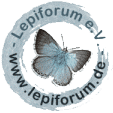

 +14Kontinente:EUAS
+14Kontinente:EUAS2. Diagnose
2.1. Weibchen
2.2. Genitalien
2.2.1. Männchen
2.2.2. Weibchen
2.3. Erstbeschreibung
3. Biologie
3.1. Nahrung der Raupe
Gaedike (2019: 75) berichtet zur interessanten Lebensweise der Art: "Larva in nests of the ant Camponotus herculeanus (Hymenoptera), probably feeding on detritus (Bengtsson, 2008). In Finland it is easy to find adults late in the evening on trunks (and sometimes buildings made of logs) inhabited by Camponotus. The specimens are mostly seen running on the trunk and often visit the holes made by the ants. Sometimes males swarm around the trunks in the evening sunshine. It seems to inhabitat most ant nests. (Mutanen, pers. comm.)."
4. Weitere Informationen
4.1. Andere Kombinationen
- Tinea truncicolella Tengström, 1848 [Originalkombination]
4.2. Synonyme
- Tinea rosenbergerella Nolcken, 1871
4.3. Faunistik
Huemer (2013: 208) berichtet über das Vorkommen in Österreich: „Eine Genitaluntersuchung angeblicher Cephimallota crassiflavella aus dem Bundesland Salzburg ergab die Zugehörigkeit zu Monopis crocicapitella bzw. als Erstmeldung für Österreich N. truncicolella (Golling, Bluntautal, 7.7.1971, leg. Mairhuber) (Kurz et al., 2010a).“
4.4. Literatur
- Gaedike, R. (2019): Tineidae II (Myrmecozelinae, Perissomasticinae, Tineinae, Hieroxestinae, Teichobiinae and Stathmopolitinae). — In: Karsholt, O., Mutanen, M. & M. Nuss (2019): Microlepidoptera of Europe 9: I-XXIII, 1-248. Leiden – Boston (Brill).
- Huemer, P. (2013): Die Schmetterlinge Österreichs (Lepidoptera). Systematische und faunistische Checkliste. — Studiohefte 12: 1-304.
- Kurz, M. A., Kurz, M. E. & G. Embacher (2010): Erstnachweis von Niditinea truncicolella (Tengström, 1848) für Österreich (Lepidoptera: Tineidae). — Salzburger Entomologische Arbeitsgemeinschaft, Newsletter 2010 (2): 11-12 [PDF auf zobodat.at].
- Erstbeschreibung: Tengström, J. M. J. (1848): Bidrag till Finlands fjäril-fauna. — Notiser ur Sällskapets pro fauna & flora fennica förhandlingar 1: 69-164. Helsingfors (A. W. Gröndahl).





















